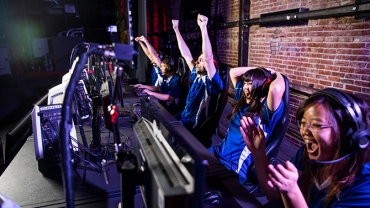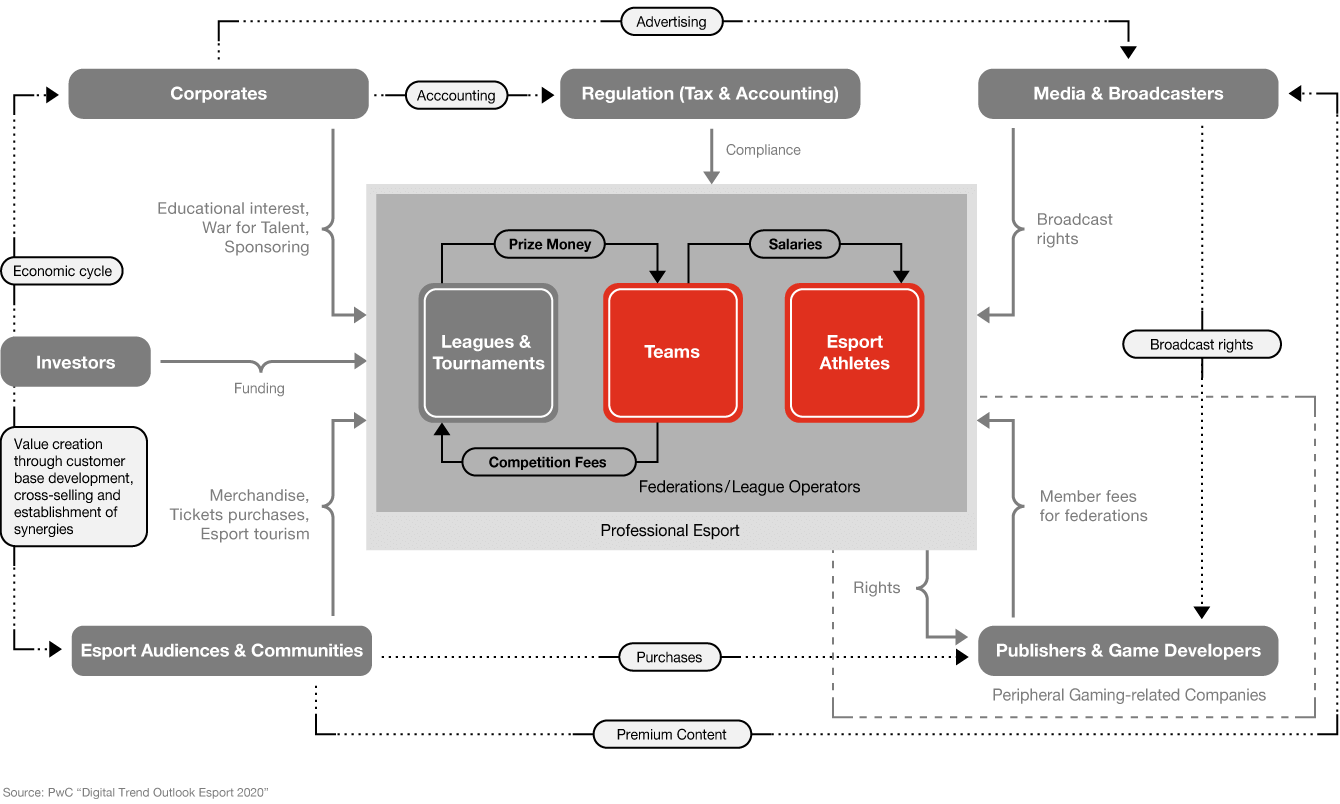
Teams & Esport Athletes: The spearhead of the ecosystem
By Gian Luca Vitale and Disht Advani. As of 2020, the most famous esports organisations include teams like Team Liquid, Cloud9, NRG Esports, G2 Esports, FaZe Clan, SK Telecom T1, OpTic Gaming, Fnatic and Evil Geniuses, which feature some of the greatest pro gamers of all time. Representing Europe, Asia, Australia, the US, South America and more, the top esports teams are from all over the world. Besides the top area of the esport the semi-professional, amateur and casual esports market is also gaining greater prominence. We will certainly see more and more offerings in this sector (e.g. amateur esports leagues with live productions and increasing prize money, analysis tools for the continuous improvement of game performance or new platforms for stronger socialization or which help to build professional structures in esports organizations).
This area in particular will make a great contribution to the growth of the industry. With the rise of this segment, we will see new esports teams entering the ecosystem and trying to build up their own brands and economic ecosystems, therefore giving investors, partners and sponsors the opportunity to participate in the development of successful esports organizations. It is already clear when we look at the top teams that dynamic esports organizations with quick decision-making processes that are not deterred by risks are more successful in the long term. What the gaming and esports world would describe as the “peeker’s advantage” also proves true in economic competition: those who work actively, aggressively and courageously are rewarded and have an advantage.

The evolution of esports teams into their own economic ecosystems
In the decades of computer game history, esports has established itself in many countries of the world and has become an integral part of society. With prize money having increased significantly over time, and with the number of events growing every year, a small niche has become a market worth billions that now attracts investors from all over the world and from a wide range of industries. For investors, esports organizations are some of the most important and most interesting players in the esports ecosystem, as they are among the central drivers and assets when it comes to economic gains. The reason is simple: esports is an emotional and entertaining form of recreation and expression that activates Generation Y, Generation Z and probably future generations. It is essential to understand that esports is now a part of culture and is influenced by major trends shaping the world.
Since top athletes only have a short period of time in which to achieve top performance, it is extremely important as a prerequisite that a successful team is able to sustainably recruit top players again and again. These players must either be brought in externally or produced by the team’s own “talent factory”. Although esports is still in an early economic growth phase and the esports organizations business model is still far from being stable and sustainable, it is apparent that some top international esports teams are now operating more successfully than others. Certainly, sporting success is one component, as success is still one of the best sales and negotiation arguments when it comes to convincing sponsors and investors – a winning team is valued more highly than a losing one, just like in other sports (e.g. football). On closer inspection, it quickly becomes clear that many esports teams are interchangeable in their appearance, activities and impact within the esports ecosystem. That makes it difficult to pinpoint a truly unique selling point (USP) in dealing with fans, brand positioning or the brand core, as well as with regard to storytelling and engagement activities.
Only the few truly successful top organizations have managed to create a clear and differentiated brand identity that also makes economic success possible. Essentially, successful esports organizations do not rely solely on sporting success. Instead, success is based on the sustainable creation of an economic ecosystem where sponsors are offered a space for positioning, but where, together with sponsors, added value is created with sponsors for the target group through dedicated products, services and experiences, true to the guiding principle that working together always creates greater added value in an ecosystem. In order to build a competitive value proposition, successful esports organizations appear in different roles and expand them dynamically and continuously, quickly throwing out approaches that do not work and strengthening successful activities.
In essence, esports organizations are not only top athletic organizations with the goal of winning sporting competitions, but are also marketing agencies and business developers, taking on several roles in the value chain and thereby generating additional revenue sources. Although there is still room for a large number of successful esports organizations, most can still be regarded as start-ups, where the brand positioning, target operating model and value proposition do not yet show a competitive USP. However, some organizations have already built a successful business model and have reached the status of a scale-up or can gradually be regarded as successful sports and entertainment companies. This allows esports organizations to be divided into different levels of maturity with a variety of characteristics (e.g. premium and champions brands, talent factory, love and lifestyle brands or product and solution provider).
This development is favored by the increasingly strong franchise models in leagues, which offer financial stability and a save room for growth for members of these ecosystems while also creating artificial barriers for up-and-coming organizations that are on an equal footing in terms of the esport, but do not have the same financial power of an investor behind them.
Backed by venture capital and experienced investors with a strong business network, this top group of esports teams is becoming increasingly detached and has already created much stronger and deeper emotional ties with their fans and the overall esports community, both locally and globally. In the years ahead, this emotional bond—the continuous creation of experiences—will form the basis for expanding and consolidating their economic ecosystems, since it creates one thing in particular: trust. Based on this trust, esports teams have the potential to advance into the different areas of life and needs of the target group with more service and product offerings in tandem with their business partners. Inevitably, in the short to medium term, the path will lead through the life areas of entertainment, consumption and socializing. In the long term, however, the life areas of health, education, mobility, sustainability and work will play a leading role. With the first signs and structures emerging, the ways in which esports teams can achieve this goal are virtually unlimited. Esports teams can act as enablers that support realizers and orchestrators by delivering technologies, products and services. But at the same time, esports teams can be the ones providing dedicated content, products and services for end users in the aforementioned life areas. Esports teams can therefore be orchestrators themselves, with intermediaries providing in-house and external products and services to the end user via B2C interfaces. As a result, successful esports teams and their business partners are clearly a strong vehicle along this transformation from pure competitive success toward a growing economic ecosystem that reaches, engages and activates a whole generation with their services and products.
This vision is underlined by increasing investment volumes in esports ventures and venues, such as esports events that objectify the enthusiasm for this sport. Even though venture investments may seem to be at a disadvantage in light of COVID-19, they will continue to grow again once the pandemic is over. The success of esports goes hand in hand with the physical and social character of esports, as well as the emotions experienced at events that will increasingly develop into festivals for upcoming generations. Top esports teams create esports hubs, becoming the veritable center of all possible esports activities that are relevant for the community—a home for their own brand identity where all aspects of esports can be celebrated, from practicing and playing with friends to watching live broadcasts or simply getting together with the community. At the same time, they offer an additional channel for partners and sponsors to get in contact with the target group along with further activation and sales possibilities. This physical trend, known in other industries as “online into offline,” will also continue to grow in esports and take esports back to its early days at cybercafes, only more, social, more immersive and on a completely new level of experience with all modern technological possibilities. Even though such structures have existed in Asia for decades, they constitute a significant growth opportunity for the West, especially for esports teams and all others involved in this economic ecosystem.
Still, many esports teams will struggle to reach this bright future. A majority of esports teams are unable to build a sustainable business model due to the aforementioned challenges and the frequent lack of a target operating model, professional internal structures and a strategic agenda. Esports organizations that want to close the gap between swimming in the same slough and success need to evolve into esports teams that guide partners and sponsors on this journey toward creating unique, strong economic ecosystems and a clear position in the market. Fulfilling this responsibility will make the difference between the success and failure of a partnership, especially when it comes to the complexity and peculiarities of the individual ecosystems in relation to the various games. Sponsors will feel particularly comfortable if these complexities and peculiarities are broken down to their own needs. As a result, esports teams will need to proactively develop, offer and implement concepts and ideas in the future.
What is more, struggling esports teams must recognize that different game-based ecosystems require different business models and that the structures, competencies and orientations of activities within the organization must be adapted accordingly. Because one structure will not fit all needs and be equally successful, it must be carefully considered why an esports team is active in a particular game, as well as which markets and target groups of sponsors and partners could be of interest. In order to catch up, the strategic agenda will have to answer the question where it makes sense to harmonize activities and operations across games and target audiences and where a more differentiated approach is needed internally and in the operating mode.
Presently, a strong diversification in many game titles seems to be a trend. But without a clear vision for the specific game, a visible positioning and transparency in dealing with interested partners and sponsors, for whom deciding to collaborate appears all the more complex, this approach seems to cost more resources than it benefits the overall organization. Internally, a reduction and focus on games can bundle resources and make them significantly more efficient. This does not mean that a multi-game approach cannot be the right way, but rather that a strategic decision has to be made at some point in time regarding the size and the maturity level of an esports organization and the number of markets in which it wants to be active, as well as regarding the structure of the current and the targeted partner and sponsor portfolio.
Apart from these strategic decisions, some esports organizations are encountering fundamental issues that inhibit sustainable growth, particularly taxes, questions about the design of the right organizational form and accounting policies. In addition, there are legal issues such as the design of contracts with the top athletes and the duty as an excellent employer to ensure a structure in which both the organization and talents can grow and develop. Such matters are all the more explosive because fiscal authorities are also catching up in their understanding of the structures within the esports ecosystem. A natural complexity results from the international nature of the activities of esports organizations. For this reason, esports organizations should give them a high priority. Due to the potential embodied by an esports team, performance both on and off the playing field is the key to success.
The main source of growth and an opportunity to participate in it
From an esports team’s perspective, sponsoring will remain extremely important going forward unless other revenue streams are expanded more strongly. In fact, sponsorship income at most esports teams will continue to cover most of the ever-increasing operating costs due to rising salaries, the growing non-player operating costs, the growing number of high-quality live productions and franchise fees.
For partners and sponsors, esports is continuing to establish itself as a true alternative to traditional sports sponsorship or as an additional source of opportunities. Especially in these dynamic macroeconomic times due to COVID-19, esports has once more proven its worth. Due to lockdowns, a larger number of viewers and gamers have had their first positive experiences with esports and have discovered the sport as a true alternative to outdoor sports or group activities. It is unlikely that this will lead to a complete renunciation of old habits, but positive experiences in trying times will remain more firmly anchored than under normal circumstances.
Partners and sponsors who are already active and have taken advantage of the opportunity will emerge from this phase with positive results and will think more intensively about expanding their esports engagement as part of their overall strategy. The community will not forget which partners have buried their heads in the sand and secretly retreated, and which partners have courageously set an example and created added value during this time. Esports can build on this momentum to activate more and more companies and partners as sponsors, thereby gaining ground in the competition for sponsorship money. One thing is for sure, with the growth of esports there is also an opportunity for brands to grow - both for existing brands and for new brands.
These synergy effects play a significant role in the current conclusion of sponsoring deals in esports. But it is also evident that sponsors and teams also acquire new markets and expand existing ones when the awareness of esports competitions increases. It has been shown and proven that sponsors in the esports sector enjoy a high level of acceptance, even though it is as yet unclear whether this is due to a good selection of companies and activities or to a fundamentally consumption-positive attitude among the young.
However, very successful interactive sponsoring measures suggest that one golden rule in particular needs to be followed: clever and authentic placements make the difference. They require an in-depth analysis of the needs and fit of a brand. Together with esports teams and other experts, sufficient consumer insights should be generated and the marketing objects should be clearly defined. Speaking the right language and knowing that the innermost core messages and values of the different communities must be respected is a must, as is creating an experience and added value. Such factors are more important here than in any other area of sponsorship, making it hard to compare the field to traditional sports sponsorship.
Although the individual investments represent only a small financial investment risk for a large company, the organic media echo of the esports and gaming community can unleash much greater and more lasting damage to a brand’s reputation. This makes it even more important to trust in the expertise and opinions of esports organizations and partners. It is becoming increasingly clear that brands and companies must deal with the topic of esports and gaming if they want to be part of the relevant set for the younger generation in the future. But that does not mean that being part of it is everything. Instead, it means being aware of the role that esports and gaming can play in the overall and digital strategy of a company. The entry should be consistent with a holistic go-to-market strategy that is in line with the vision and mission of a company and supports the different business objectives. Esports organizations, partnerships and sponsoring offer a particularly promising way.
Contact us

Werner Ballhaus
Global Leader Entertainment & Media, Partner, PwC Germany
Tel: +49 211 981-5848


Gian Luca Vitale
Gaming & Esports Business Advisory, Senior Associate, PwC Germany
Tel: +49 175 8534-794


Contact us





